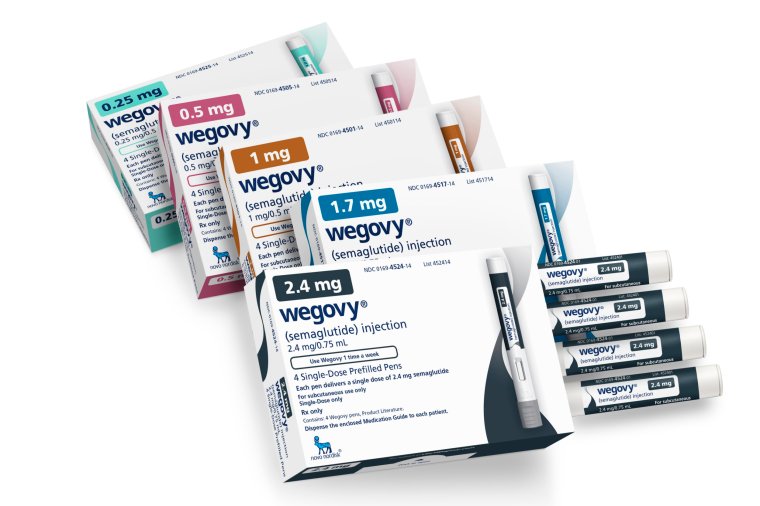The manufacturer of Ozempic has said it expects the current shortage of the diabetes drug to continue into 2024 as it called for a reduction to off-label prescriptions for weight-loss treatment.
Ozempic – a brand name for the drug semaglutide – was introduced in the UK four years ago to help type 2 diabetics manage their blood glucose levels.
While the drug is only officially licensed for the treatment of diabetes, it has increasingly been prescribed “off-label” for weight-loss, gaining popularity among celebrities, social media influencers and politicians including Boris Johnson.
Doctors can prescribe a medication “off-label” if they are convinced of its effectiveness in treating a condition, even if it is not licensed for that specific purpose. Online pharmacies have played a leading role in prescribing and selling Ozempic off-label.
The drug mimics a hormone called glucagon-like peptide-1 (GLP-1), which is released after eating. This makes people feel full, meaning they eat less and lose weight.
A recent study found that people who were given the drug as part of a weight-loss programme saw their weight drop by 12 per cent on average after 68 weeks.
However, the surge in demand for Ozempic has left its sole manufacturer, Novo Nordisk, struggling to keep up with supply. As a result, pharmacists have been left unable to meet GP prescriptions – putting diabetics at risk.

The Danish firm told i that it expects the “intermittent supply” of Ozempic to continue into next year in the UK, adding that it is working with authorities to discourage off-brand prescription.
A spokesperson for Novo Nordisk said: “Ensuring a continuous supply that meets the needs of patients and the NHS is of the utmost importance to Novo Nordisk. The situation is evolving all the time, but we do anticipate that the intermittent supply of Ozempic (semaglutide) will continue into 2024 in the UK.
“We are in constant conversations with the Department of Health and are working together to keep healthcare professionals, including pharmacists, updated with the latest guidance.
“We are also working closely with the relevant authorities to discourage the off-label use of our medicines.
“As part of this the Department of Health is issuing communications about the status of our shortages, and the appropriate and responsible use of our medicines to healthcare professionals.”
The company said the shortage was due to “unprecedented levels of demand”.
“While we have made significant efforts to increase production, the level of demand has impacted our supply of Ozempic,” the spokesperson added. “We are running our factories 24 hours a day, seven days a week, and have invested in opening new production lines and facilities. We are working to remedy the shortage as soon as possible.”
Diabetes UK has expressed concerns that patients with repeat prescriptions are being affected by the supply issues, despite previous assurances that they would be protected.
Pharmacists on the front line have described the situation as a “complete mess”, with some local health boards being forced to prescribe alternative medicines to diabetic patients.
One 66-year-old woman told i last week that she regularly has to call up to 30 pharmacies to find one where Ozempic is in stock, after she suffered a near fatal reaction to alternative medication.
Leyla Hannbeck, chief executive at the Association of Independent Multiple Pharmacies, told i that she expects the shortage to continue into next year unless the trend of prescribing the drug for weight-loss changes.
She said: “I think it’s likely that the shortage continues into 2024 if the current trend around the world for this product continues.
“We know that it generally takes longer to manufacturer products now compared to before the pandemic. That, combined with the high demand, means Ozempic will be unavailable for some time.”
Novo Nordisk needs to provide pharmacists a “realistic timeframe” of when the shortage will end, Ms Hannbeck said, so they can manage patients’ expectations.

“The manufacturer is wary of telling us exactly when it will be available, as they have previously promised that supply would get back to normal and it hasn’t,” she said.
She added: “It was quite evident some months ago that this product was in high demand and this situation has already been going on in the US for two years. You would have thought that they would anticipated the shortage sooner.”
The supply issues have led Novo Nordisk to indefinitely delay the UK rollout of another semaglutide drug – Wegovy – which has been licensed for weight-loss treatment.
In May, the National Institute for Health and Care Excellence recommended the use of the drug for treating adults with a Body Mass Index of at least 35 and one weight-related health condition – such as diabetes or high blood pressure.
Earlier this month, Rishi Sunak announced a £40m pilot scheme to expand access to Wegovy beyond specialist weight management services, which are usually based in hospitals, enabling GPs to prescribe the drug.
Pharmacists were originally expecting to begin receiving supply of Wegovy in May.
A Department of Health and Social Care spokesperson said: “There are some ongoing supply issues with Ozempic, and we are working closely with partners to support the NHS in managing this issue so diabetes patients can access the drugs they need.
“We have issued guidance to prescribers and pharmacists that medicines which are solely licensed to treat type 2 diabetes – such as Ozempic – should not be routinely prescribed for weight loss. It should only be prescribed for treatment of type 2 diabetes.”



Grindr must act but there are darker reasons why children are on the dating app